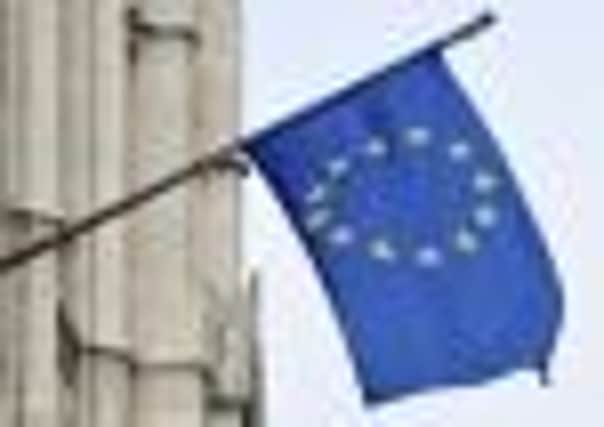Leaders: Currency question diverts from more basic economic problem


Most commodity trading, including oil, is done in either dollars or euros, he argues. Compared to these two mighty currencies sterling, which the SNP says it wishes to retain, is marginal. Why would an independent Scotland want to be part of a such an irrelevant, globally insignificant, currency zone, when it could be playing with the big boys by joining the euro?
For two very good interrelated reasons. First, the economics. The crisis in Greece and other euro-zone countries had exposed the weakness of a currency union driven more by pan-European idealism than by a desire for sound fiscal rectitude inside the EU. The Greeks, understandably, have been railing against the imposition of austerity on them by the Germans. If it were in the euro, a small country like Scotland, though not as financially imperilled as Greece, would have its monetary policy effectively run by Frankfurt.
Advertisement
Hide AdAdvertisement
Hide AdThen there is the politics. Although it is by no means clear the rest of the UK would be happy for Scotland to retain sterling, and on what terms, let us assume the currency union was maintained after independence. Keeping the pound in their pocket, to use a phrase of old, would be reassuring for Scots worried about separation from the UK, as the SNP intends it to be. Any change to the euro would also require a referendum.
Scots would not only be asked to make a further fundamental change to their way of life, after the leap to independence, but in so doing many of us would look to the experience of small European countries, especially Ireland, who have their monetary policy imposed by the European Central Bank. Given this, would control from Frankfurt be favoured over London?
The question over whether retaining sterling after independence has been well aired on these pages, and we will return to it, but in discussing Prof Garelli’s views we would be wrong to neglect another part of his argument. He maintains Scotland does not have enough medium-sized industries to ensure economic success after independence. In this he has identified a key weakness of the Scottish economy which effects us now and has a significant influence on the prospects for growth, whatever the constitutional position. If we were independent, or adopted devo-max, we would need more medium-sized businesses to provide growth, employment, and taxes. How we would do that is a key challenge to all politicians, but obviously particularly to the party in power. The Nationalists would argue lowering corporation tax is the solution but we need more evidence before we accept that as fact. That would make a good subject for Prof Garelli’s next visit.
Lessons learned more important than blame
The name Hillsborough echoes chillingly down the years. Its mention brings back searing memories of a disaster which claimed the lives of 96 football supporters at the stadium in 1989 for an FA Cup semi-final between Liverpool and Nottingham Forest. Although the then Tory government backed away from supporters membership schemes, legislation in the wake of the catastrophe led to huge safety improvements including the requirement for large stadiums to be all-seater.
There is, however, one issue which has not been resolved to the satisfaction of Liverpool fans at least and that is, where does the blame lie for the disaster? There has been a long campaign for documents relating to it to be made public to which the government has finally been forced to agree.
Yesterday some of those documents were leaked, showing the then prime minister Margaret Thatcher was told a senior Merseyside police officer blamed “drunken Liverpool fans” for the tragedy, a claim disputed by the club’s supporters who said it shifted responsibility from South Yorkshire police whose crowd control was criticised in the original investigation.
Although by no means the sole cause, it is probable alcohol played some part. To this day, football and rugby fans drink, some to excess, before games. What has changed is police are better at dealing with drink-fuelled crowds and all-seater grounds make fatal crushes far less likely. Whatever the truth about Hillsborough, wherever the blame lies, this is the lesson which must be remembered, particularly by those who advocate a return to terraces at football grounds.
Garage beats glamour in trademark battle
One encapsulates “the metropolitan glamour: an eclectic and contemporary brand, the expression of a changing world”. The other changes your spark plugs. One is “a style without borders”. The other will replace your carburetter.
Advertisement
Hide AdAdvertisement
Hide AdThe problem is both are called D&G, and that was where the trouble started. For when D&G Autocare, run by David Hunter and George Simpson (there’s a clue) tried to register their name as a trademark they ruffled a famous fashion house’s feathers.
Immediately, Dolce & Gabbana’s highly paid trademark agents wrote to the Fife firm saying its application overlapped with their registered trademark and it was likely that people could be confused between the two businesses. Obviously.
One D&G is based in the fashion capital of Scotland, Dunfermline, has 45 staff and a turnover of £3 million. The other D&G, named after Domenico Dolce and Stefano Gabbana, has a head office in Europe’s fashion capital Milan, 3150 staff and turns more than €600 million
Thankfully the dispute was resolved as D&G (Milan) failed to lodge their objection in time though their heavy-handed action cost D&G (Dunfermline) a lot of time and money. It was a victory, as Mr Simpson said, of D&G proportions – that’s David and Goliath.